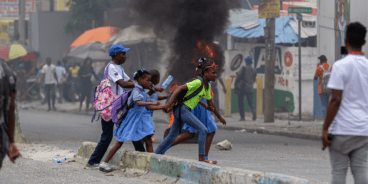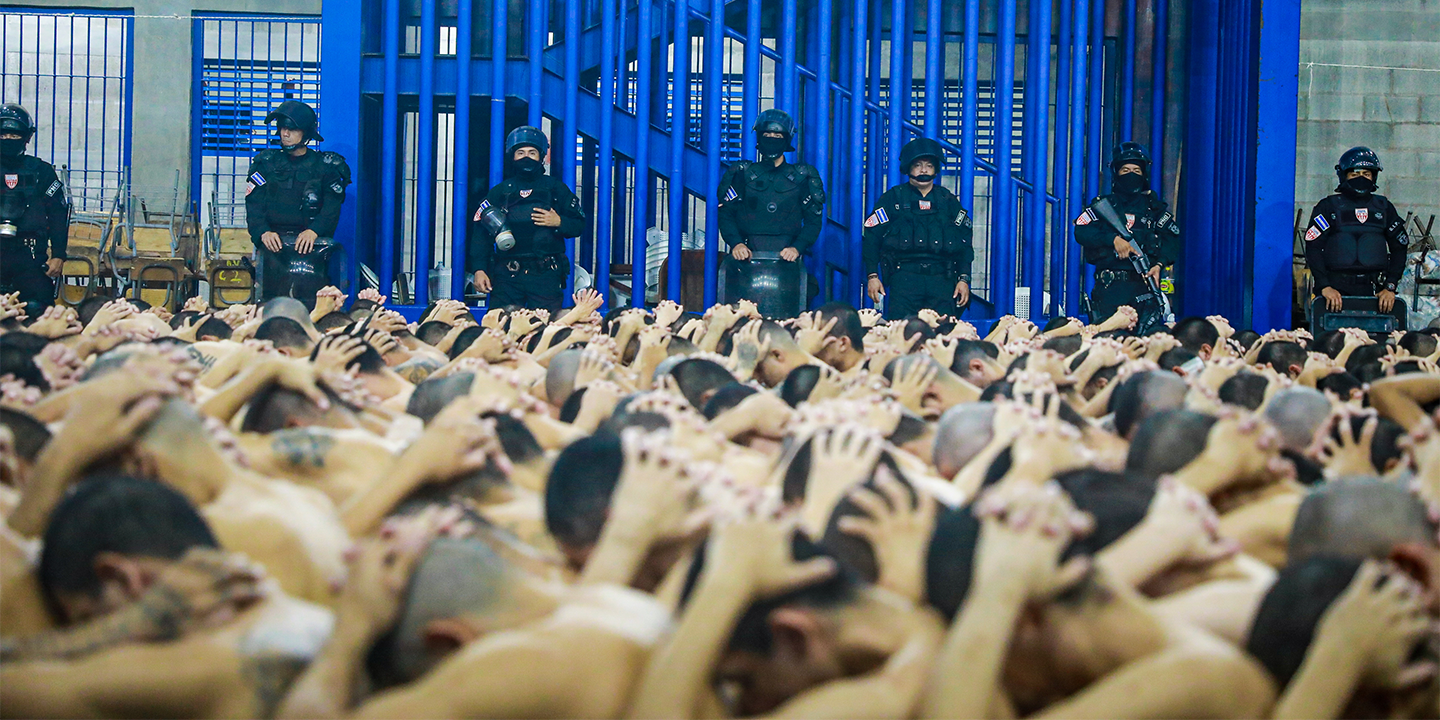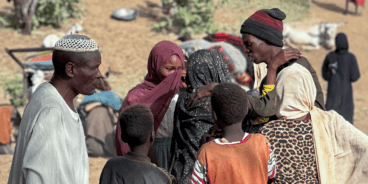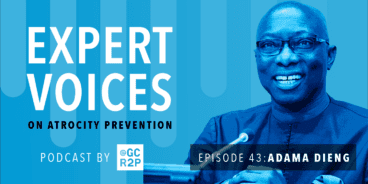

Atrocity Alert No. 358: El Salvador, Nagorno-Karabakh and UN peacekeeping
Atrocity Alert is a weekly publication by the Global Centre for the Responsibility to Protect highlighting situations where populations are at risk of, or are enduring, mass atrocity crimes.
EL SALVADOR’S LEGISLATIVE ASSEMBLY PAVES THE WAY FOR COURTS TO HOLD MASS TRIALS
On 26 July El Salvador’s Legislative Assembly approved legal reforms to formally allow courts to hold mass trials of up to 900 individuals per trial. Under the policy, individuals can be grouped on the basis of what region they come from or on alleged membership within the same criminal group. This decision is the latest measure in a campaign by President Nayib Bukele’s government to curb gang violence that has been systematically marked by widespread human rights violations and abuses. On 1 August President Bukele announced the deployment of at least 8,000 security forces to close off more than 390 square miles in the Cabañas department, north-central El Salvador, noting that the government had identified “several groups of gang members hiding there,” and warned that “no gang members will be allowed to leave.”
Since the Legislative Assembly – where supporters of President Bukele are in the majority – imposed a state of emergency on 27 March 2022, more than 70,000 individuals have been arrested, most of whom have been arbitrarily detained and subjected to torture and ill-treatment, short-term enforced disappearances and widespread violations of civil rights. While more than 7,900 human rights violations were documented between March 2022 and March 2023 alone, the actual figure is likely much higher given underreporting due to fear of reprisals by state agents. On 14 July the Inter-American Commission on Human Rights warned that at least 174 individuals have died while in state custody. In May the non-governmental organization Cristosal warned that ongoing violations and abuses are carried out as a state policy with the deliberate and systematic targeting of a “specific segment of the population,” including mostly young men in marginalized communities, without any evidence of connection to criminal gangs. Cristosal also concluded that these violations and abuses may amount to crimes against humanity.
Elisabeth Pramendorfer, Latin America expert at the Global Centre for the Responsibility to Protect, warned that “the latest decision by the Legislative Assembly not only effectively denies due process rights and leaves tens of thousands at risk of arbitrary prison sentences, but also underlines how the deliberate dismantling of democratic guarantees has contributed to an environment conducive to the commission of possible atrocity crimes.”
Since taking office in 2019, President Bukele has taken systematic steps to undermine human rights protections, including attacks on the independence of the country’s legislative and judicial system. His iron-fist policies – leading to a stark decrease in homicides and record-high approval ratings – may appear as effective measures to achieve immediate results against gang violence. However, securitization and mass suspension of civic rights only exacerbates the vulnerabilities of already marginalized communities and leads countries further into crisis when what is needed are long-term strategies aimed at addressing deep rooted socio-economic inequality.
ONGOING BLOCKADE PUTS THOUSANDS AT RISK IN NAGORNO-KARABAKH
For more than seven months Azerbaijani authorities have blockaded the Lachin corridor, the sole road connecting Nagorno-Karabakh with Armenia, precipitating a humanitarian crisis. The blockade has deprived over 120,000 ethnic Armenians living in Nagorno-Karabakh, including 30,000 children, of life-saving resources such as food, medicine, electricity and fuel. On 28 July Armenian authorities accused Azerbaijan of denying transport of over 400 tons of humanitarian aid into Nagorno-Karabakh. In a statement issued on 25 July the International Committee of the Red Cross (ICRC) reported that despite persistent efforts, “the last time the ICRC was allowed to bring medical items and essential food items into the area was several weeks ago.”
Deprivation of resources indispensable to survival imposes excessive burdens upon civilians that may eventually result in immense suffering and loss of life. Under International Humanitarian Law, all sides must allow and facilitate the rapid and unimpeded passage of humanitarian relief for civilians in need, including medical supplies and essential food. The intentional and unlawful denial of humanitarian assistance may constitute war crimes and crimes against humanity.
Nagorno-Karabakh is internationally recognized as part of Azerbaijan but contains a majority ethnic Armenian population that has been led by de-facto authorities since December 1991. There is a long history of armed clashes between Armenia and Azerbaijan for control of Nagorno-Karabakh. Despite a 1994 ceasefire agreement, sporadic clashes have continued along the border of Nagorno-Karabakh over the past 25 years, including intense fighting in September-November 2020 that concluded after a peace deal brokered by Russia. The blockade began on 12 December 2022, after Azerbaijani environmental activists, allegedly supported by the country’s authorities, blocked the Lachin corridor in protest of the alleged exploitation of minerals. Azerbaijani authorities formalized the blockade by establishing a border point at the entrance to the corridor in late April 2023. Ongoing attempts to deescalate tensions – which have risen amidst the blockade – and broker a new peace treaty have been unsuccessful thus far.
On 25 February the International Court of Justice (ICJ) ordered Azerbaijan to ensure free movement of all persons, vehicles and cargo along the Lachin corridor in both directions. Meanwhile, during July the President of Nagorno-Karabakh, Arayik Harutyunyan, requested Luis Moreno Ocampo, former chief prosecutor of the International Criminal Court, for an expert opinion on the blockade. While the opinion has no legal implications, it may help determine if the situation in Nagorno-Karabakh merits further investigation.
Azerbaijani authorities must immediately lift the blockade of the Lachin corridor and allow for unhindered and safe passage of civilians and goods along the corridor, as well as guarantee unimpeded humanitarian access in line with international law and the order by the ICJ. States must engage in further dialogue with all parties, as well as support calls from the Parliamentary Assembly of the Council of Europe to establish an independent fact-finding mission to assess the humanitarian situation.
THE FUTURE OF UN PEACEKEEPING AND CIVILIAN PROTECTION
In recent years, UN peacekeeping operations have increasingly operated in more complex and dangerous environments marked by many challenges, including asymmetrical threats that endanger the lives of civilians, the safety and security of peacekeepers, as well as the effective implementation of mandates. During a UN Security Council briefing on Friday, 28 July, the Force Commanders of the peacekeeping operations in South Sudan (UNMISS), the Democratic Republic of the Congo (MONUSCO) and Lebanon reflected upon the role of military components in the protection of civilians and the challenges faced during implementation of their respective mandates.
The Force Commander of MONUSCO described evolving new threats, including the spread of disinformation and hate speech, which has endangered civilians in the conflict-ridden eastern provinces and provoked anti-UN sentiments and attacks against peacekeepers. Discussion of a phased and “responsible” withdrawal of MONUSCO has raised serious concerns regarding the future of civilian protection as myriad armed groups continue to perpetrate recurrent attacks with impunity. In South Sudan, recurrent inter-communal and subnational violence resulting in cattle raids, abductions and revenge killings continues to put civilians at risk of atrocities. To adequately respond to these threats and protect civilians, UNMISS has increasingly established temporary bases in areas at risk of escalation in accordance with its early warning and response mechanisms.
Meanwhile, the protection of civilians and human rights mandate of the peacekeeping operation in the Central African Republic (MINUSCA) has been hindered by the presence of mercenary operatives from the Wagner Group. Mercenary operatives have deliberately impeded the freedom of movement of peacekeepers, as well as been accused of systematically hindering the work of UN investigators in areas where alleged crimes have occurred. Additionally, predatory armed groups in the west of the country have increasingly used explosive devices, presenting growing threats to civilians while also hampering MINUSCA’s civilian protection efforts. Last October a roadside bomb reportedly planted by an armed group killed three peacekeepers and severely injured several others while traveling on night patrol as part of its protection of civilians mandate.
Savita Pawnday, Executive Director of the Global Centre for the Responsibility to Protect, said, “Given the current unparalleled levels of global human displacement, and escalating levels of conflict and violence, the UN and its member states must strengthen their commitment to peacekeeping. As peacekeeping operations face growing asymmetrical threats, the missions must adapt their civilian protection strategies to maximize their impact wherever possible to better protect vulnerable populations.”
Related Content


Atrocity Alert No. 435: Sudan, Israel and the Occupied Palestinian Territory and Democratic Republic of the Congo
